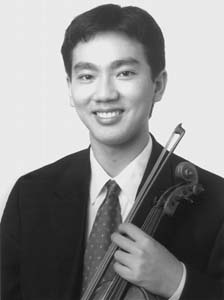![[MetroActive Music]](/music/gifs/music468.gif)
[ Music Index | Santa Cruz Week | MetroActive Central | Archives ]
Expression Session
Though with a skilled orchestra at his command, conductor John Larry Granger has unfinished work on musical expression
By Scott MacClelland
WITHOUT A DOUBT, John Larry Granger's greatest contribution to Santa Cruz is a polished, well-disciplined orchestra. Years of hard work have not only concentrated community pride, but also focused the burden of artistic proof where it belongs--on the conductor, the lens through which the artistic product lives, limps or dies.
On this particular point, Schubert's Symphony in B Minor (Unfinished) showed both Granger's strengths and his weaknesses in the symphony's second concert of the season Nov. 6 at the Santa Cruz Civic Auditorium. If the argument began and ended with Schubert's groundbreaking score, then Granger and his orchestra were a shoo-in success. But since music notation (the printed score) is seriously limited in its capacity to convey the character of a work, Granger's interpretation of the Schubert masterpiece left much to be desired.
Through the example of many conductors, the "Unfinished" has been revealed for its dramatic possibilities, its surging, smoldering personality. To release its potential requires an active, probing penetration of its meaning in that universally abstract language we call music. While Granger made a fine account of dynamic contrasts, he gave far too little attention to rhythmic tension, the greater source of the work's expressive power. Rhythmic conflicts energize the piece by pushing forward and pulling back, and without them it can grow tedious and lose purpose--which is what happened here. Moreover, without clearly contrasting the tempi of the two similarly paced movements, the conductor lost yet another opportunity for creating timely urgency.
By contrast, Frank Huang, winner of last year's Klein String Competition, gave the Civic audience a truly engaging personality. This young man of good looks and graceful manner produced a sweetly singing tone and virtually flawless technique in Mozart's Violin Concerto in A (Turkish) and took special pleasure in the three solo cadenzas composed by Joseph Joachim, the great 19th-century violinist for whom Brahms wrote his concerto. The 20-year-old Texas-born Huang, a pupil of the Cleveland Quartet's founding principal violin, Donald Weilerstein, is just a year older than Mozart was when he composed the concerto. Oddly, patrician elegance does not always age well, but in persons so young it somehow seems the embodiment of good taste. In addition, Huang flashed bold assertiveness in all the right moments.
With its vivacious orchestration, Copland's Appalachian Spring gave the program's second half a stunning display of sonic effects. This was, of course, the musicians' show-off piece, and they came through with colors flying. Musical notation by the early 20th century had become far more sophisticated than in the days of Schubert. By the same token, Copland was nothing if not a man of unsentimental exactitude. This, therefore, was Granger's meat, where his talents burn brightest and his precise podium technique makes all the difference. The rare moment or two of blurred effects in a sea of tricky syncopation could not be blamed on any miscue from the podium. At its conclusion, Granger waded into the orchestra to celebrate the many solo contributions of his players, first and foremost among them flutist Dawn Walker.
Copyright © Metro Publishing Inc. Maintained by Boulevards New Media.
![]()
 Young Virtuoso: Klein String Competition winner Frank Huang showed flawless technique and patrician elegance in Mozart's Violin Concerto in A ('Turkish').
Young Virtuoso: Klein String Competition winner Frank Huang showed flawless technique and patrician elegance in Mozart's Violin Concerto in A ('Turkish').
From the November 10-17, 1999 issue of Metro Santa Cruz.